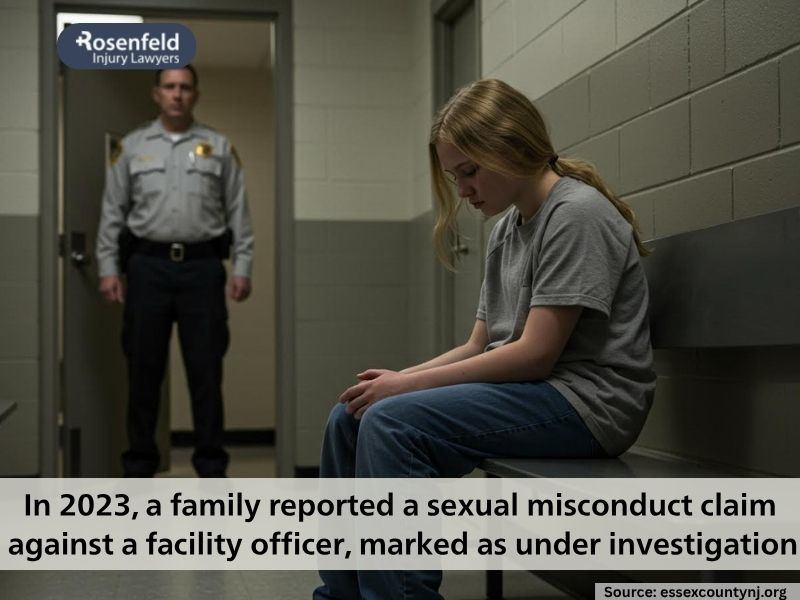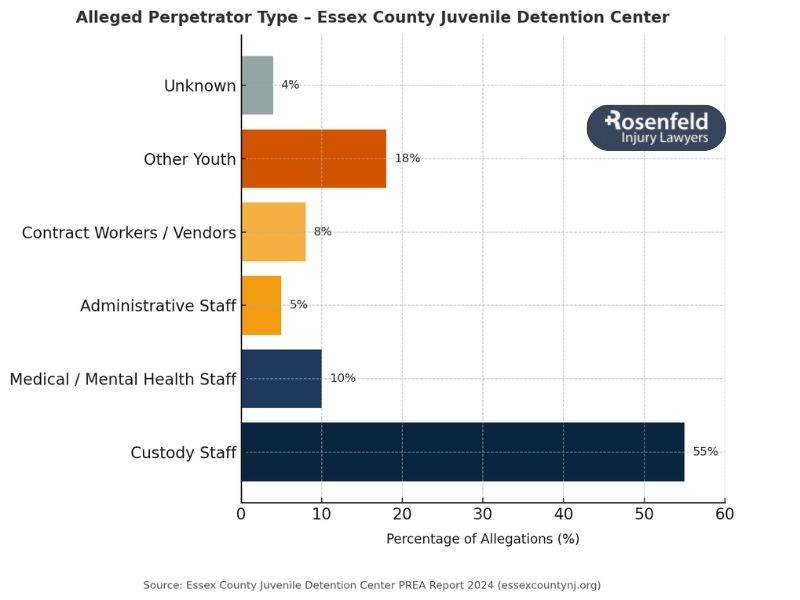Essex County Juvenile Detention Center Sexual Abuse Lawsuits
Top-Rated Essex County Juvenile Detention Center Sexual Abuse Lawyer
At Injury Lawyer Team, we represent survivors of Essex County Juvenile Detention Center sexual abuse. Our New Jersey sexual abuse lawsuit attorneys know the devastating impact abuse in youth detention centers can have on young people. Instead of protecting them, the Essex County facility has faced allegations of sexual acts, youth-on-youth assaults, systemic neglect, and inadequate medical treatment.
No child should suffer abuse or mistreatment in a New Jersey juvenile detention facility. Survivors often carry the trauma into adulthood, which is why we help them pursue legal action, hold the county accountable, and seek financial compensation through a civil lawsuit.
The Allegations of Abuse at ECJDC
Public records and lawsuits show Essex County Juvenile Detention Center (ECJDC) blocked a federally authorized watchdog from investigating reports of sexual abuse, neglect, and inadequate services until a 2024 federal court order forced access.
These claims mirror hundreds of New Jersey lawsuits in which sexually abused underage inmates described staff misconduct, youth-on-youth assaults, and systemic negligence in youth detention centers statewide.
A History of Staff Misconduct and Filed Lawsuits by Survivors
Brave survivors have filed lawsuits alleging widespread abuse by staff, inadequate medical treatment, and retaliation for reporting. In 2025, the state consolidated 350+ lawsuits from multiple juvenile facilities, including ECJDC, showing just how prevalent the alleged abuse has been.
The Duty of Care Owed by the Essex County Juvenile Facility
Under law, ECJDC owed a strict legal duty to protect detained children from harm, provide medical and mental-health care, ensure safe education services, and follow PREA standards. Ignoring red flags or blocking oversight violates that duty and exposes the county to liability.
Claims of Institutional Negligence at the Detention Center
Survivors and advocates point to negligent hiring, poor supervision, ignored complaints, weak training, and inadequate medical response as root causes of the abuse. These systemic failures support sexual abuse civil lawsuits seeking financial compensation and reforms at the county youth detention center.

What Are the Most Common Causes of Abuse in NJ Youth Detention Centers?
In our experience with New Jersey juvenile detention cases, several systemic issues repeatedly created environments in which detainees could be sexually abused:
- Understaffing & Overcrowding: Fewer staff and crowded dorms mean less supervision and more blind spots.
- Poor Training & Turnover: Inconsistent PREA training and high staff turnover weaken safety protocols.
- Negligent Hiring: Inadequate background checks allow risky staff to work with underage inmates.
- Weak Medical & Mental Health Care: Delayed medical care and counseling worsen trauma and destroy evidence.
- Culture of Secrecy: Retaliation and ignored complaints silence victims and staff whistleblowers.
- Lack of Oversight: Blocking inspections or slow investigations lets abuse persist.
Proving these failures is essential in a juvenile detention sexual abuse case to hold facilities accountable and secure financial damages for survivors.
The Lifelong Trauma of Childhood Sexual Abuse on Survivors
Sexually abused minors in youth detention centers often carry the impact well into adulthood. Many develop PTSD, depression, anxiety, and trust issues that affect relationships, work, and overall health.
Others struggle with substance abuse, self-esteem, or anger stemming from their trauma. Without proper medical attention and counseling, these wounds can deepen over time.
In our youth detention center sexual assault lawsuit work, we highlight these lifelong effects to show courts and juries the full scope of harm, helping survivors secure compensation for the damage done.
What Damages Can Adult Survivors Recover in a Civil Lawsuit?
Adult survivors of juvenile detention facility sexual abuse in New Jersey have the right to pursue a lawsuit seeking a range of damages that reflect the full impact of the abuse:
- Economic Damages: Costs for therapy, psychiatric care, medical treatment, medications, and future mental-health support, as well as lost wages or reduced earning capacity caused by trauma.
- Non-Economic Damages: Compensation for pain and suffering, emotional distress, PTSD, depression, anxiety, humiliation, and loss of enjoyment of life—intangible but very real injuries.
- Punitive Damages: In cases of egregious or intentional misconduct, courts can award punitive damages to punish and deter reckless behavior by staff members or institutions.
- Future Costs & Support: Many survivors need ongoing counseling or residential care; we work to project and include these expenses in civil claims to ensure long-term stability.
Why You Need an Experienced Essex County Abuse Lawyer
Taking on New Jersey sexual assault cases means confronting powerful government institutions, county attorneys, and insurance carriers.
These cases involve complex NJ laws, strict procedural rules, and layers of immunity that can block recovery unless challenged by experienced counsel.
An attorney specialized in representing youth inmates sexually abused in juvenile detention understands how to:
- Navigate the New Jersey juvenile justice commission regulations and deadlines.
- Gather internal records, policies, and PREA compliance documents to prove systemic negligence.
- Work with medical, mental health, and security experts to document the survivor’s injuries.
- Challenge government immunity defenses and negotiate with multiple defendants.
Our firm has handled sexual assault lawsuits against juvenile centers, school systems, and county agencies. We know how to preserve evidence, build a clear case narrative, and seek compensation and justice for survivors.

New Jersey Laws Governing Child Sexual Abuse Claims
Survivors of child sexual abuse in New Jersey juvenile detention institutions have important rights under both state and federal law. Key provisions include:
State Laws
- N.J. Stat. Ann. § 9:6-8.10 – Requires mandatory reporting of suspected child abuse by staff members, contractors, and other professionals working with minors.
- N.J.A.C. 13:101 (Juvenile Justice Commission Regulations) – Sets operational standards for juvenile detention facilities, including staffing, training, and safety requirements. Violations can be used as evidence of systemic failure in a lawsuit.
Federal Laws
- PREA (Prison Rape Elimination Act) – Establishes national standards for preventing, detecting, and responding to detention center sexual assault.
- CRIPA (Civil Rights of Institutionalized Persons Act) – Allows the U.S. Department of Justice to investigate and sue facilities, including juvenile detention, for patterns of unconstitutional conditions or abuse.
How Long Do Victims Have to File a Lawsuit?
Under NJ law, survivors who were sexually abused in childhood now have some of the strongest protections in the country.
Thanks to the 2019 amendments to N.J. Stat. Ann. § 2A:14-2a, survivors can file a civil lawsuit up until their 55th birthday, or within seven years of discovering that their injuries were linked to past abuse, whichever is later. This applies to abuse that occurred in juvenile detention as well as other institutions.
For adult survivors (18 or older at the time of abuse), the statute of limitations is generally seven years from discovery, but courts have been increasingly open to claims where delayed reporting was reasonable due to trauma. Acting promptly is still important, since evidence and witness memories fade over time.
Who Is Liable for Abuse at the Essex County Juvenile Detention Center?
In a youth detention center sexual assault lawsuit, multiple parties may be legally responsible for the harm caused. At ECJDC, potential liable parties in the legal process include:
- Individual Abusers: Staff members, contractors, or other detainees performing sexual acts or allowing abuse, assaults, or retaliation.
- Supervisors and Administrators: Warden, shift supervisors, and program managers who ignored warnings, failed to supervise staff, or discouraged complaints.
- Essex County (the Government Entity): The county that owns and operates the youth detention center can be held liable for systemic neglect, faulty hiring process, and failure to provide adequate medical treatment or education services.
- Juvenile Justice Commission (JJC): For policies and oversight failures related to NJ juvenile detention standards.
- Third-Party Contractors: Private medical, mental health, or security providers working at ECJDC who failed to meet professional standards or covered up abuse.
How to Strengthen Your Civil Lawsuit Against Essex County
If you’re considering a youth detention center sexual assault lawsuit against Essex County, there are practical steps you can take right now to protect your rights and strengthen your case:
- Write Down Memories Early: Record dates, names, locations, and details of what happened at the facility. Even partial memories can be valuable evidence later.
- Seek Therapeutic Support: Seeing a licensed therapist or counselor aids healing and creates professional records documenting PTSD, anxiety, or depression linked to the abuse.
- Preserve Evidence: Keep any letters, emails, medical records, or grievance forms you may have filed. If you still have contact information for witnesses or other survivors, share it with your attorney.
- Document Ongoing Impact: Track how the abuse affects your work, relationships, and health—this helps prove damages like lost wages or emotional distress.
- Avoid Direct Contact with the County: Don’t sign releases, give statements, or accept settlements without legal advice.
- Contact a Specialized Attorney Early: An attorney experienced in sexual abuse lawsuits can file timely claims, secure records before they disappear, and protect you from retaliation.
Taking these steps can make your lawsuit stronger, help you seek justice, and maximize your chance of compensation for the harm you endured.

How Injury Lawyer Team Can Help
At Injury Lawyer Team, we represent survivors of sexual abuse in Essex County Juvenile Detention Center and other New Jersey juvenile detention centers. Our attorneys provide a safe, confidential space to discuss your case and fight for justice.
We offer:
- Free, confidential consultations to explain your legal options.
- Independent investigations of PREA compliance, staffing records, and medical files.
- Strategic filing of civil claims against all liable parties.
- Collaboration with medical and mental-health experts to document trauma and damages.
- Aggressive advocacy in settlement or trial to secure monetary compensation.
Our team knows how to confront powerful institutions, hold them accountable for detention center sexual assault, and help survivors seek justice through a strong sexual abuse civil lawsuit.
Schedule a Confidential, Free Consultation with Our Law Firm Today
If you or someone you love endured abuse at the Essex County Juvenile Detention Center, you don’t have to face it alone. At Injury Lawyer Team, our attorneys are experienced in handling every aspect of a youth detention center sexual abuse lawsuit—from investigation to trial—and we provide a safe, supportive space for adult survivors to explore their legal options without pressure.
Our free consultations are 100% confidential, and we work on a contingency fee basis, which means you pay nothing unless we recover compensation for you. We listen with compassion, explain your rights under New Jersey law, and outline how we can help you pursue legal action, hold the county accountable, and seek compensation.
Contact Injury Lawyer Team today to schedule your confidential consultation.
All content undergoes thorough legal review by experienced attorneys, including Jonathan Rosenfeld. With 25 years of experience in personal injury law and over 100 years of combined legal expertise within our team, we ensure that every article is legally accurate, compliant, and reflects current legal standards.








